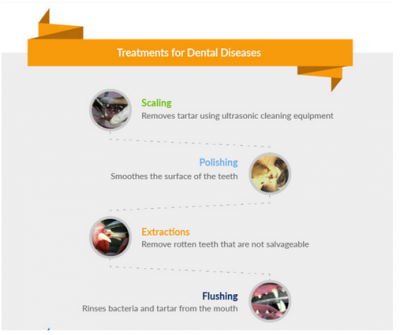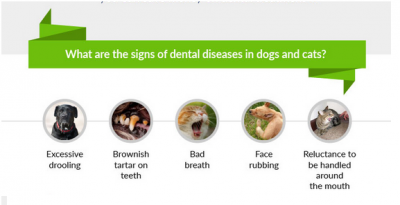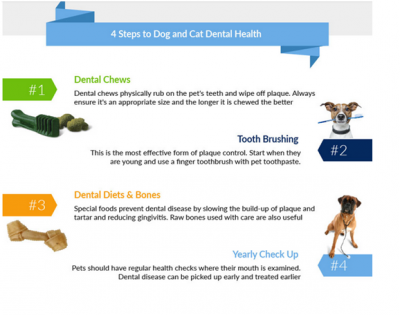
As humans, we take care of our teeth and our pets should be no different. Dogs need to receive the correct oral care if you want to maintain their overall health and hygiene. Poor oral health in pets can result in more serious health problems, making dog dental care absolutely essential.
What does Veterinary Dentistry Include?
Veterinary dentistry procedures include cleaning, extraction, filing, adjustment and repair of your cat or dog’s teeth and all other components of oral health care. These procedures should be conducted by a veterinarian or a certified veterinary dentist. Certain procedures can also be performed by veterinary technicians under a vet’s supervision; however this is subject to local regulations.
Since most of the dental problems in dogs take place below the gum line, a complete dental cleaning and examination is performed under anesthesia. Your vet or vet dentist clinic will first perform an oral checkup which includes X-rays to evaluate the health of tooth roots and jaws. The process of cleaning includes scaling and polishing, similar to what we do with our human teeth.

Dental Health in Pets
You should visit your vet at least once a year for a dental checkup. They will be able to detect the early signs of dental problems and treat them before they get worse. Keep an eye out for the following symptoms:
- Bad odor
- Loose or broken teeth
- Discolored teeth or teeth with tartar
- Abnormal chewing or dropping of food from mouth
- Reduced appetite or reluctance to eat
- Pain in or around oral cavity
- Bleeding in mouth
- Swelling in or around mouth
Increasing irritability is also a sign of dental problems. Always take your dog to the vet in the case of any abnormal behaviour. Be careful while self-examining your pet’s mouth, if it is painful for your dog, they may bite.
Causes of Dental Problems in Pets
Cavities are comparatively less common in animals than in humans. However other problems are much similar to those we have. They include:
- Chipped teeth and damaged roots
- Infected teeth or abscesses
- Periodontal disease
- Fractured jaw
- Tumors or cysts in oral cavity
- Defects in palate
- Misalignment or malocclusion in teeth and bite
Among these, periodontal disease is the most common dental problem in both cats and dogs. Your dog will likely show early evidences of periodontal disease around the age of three. This problem worsens with age if left untreated.

Early detection is essential in order to avoid the dreadful complications that arise in the future. Periodontal disease can cause further health problems of the liver, kidney and heart muscle if left untreated.
The main cause of periodontal disease is plaque that eventually turns into tartar. Plaque and tartar above the gum line can be seen and cleaned, but below the gum line is not as easy and is difficult to remove. Periodontal disease causes infection and damages the jawbone and surrounding tissue.
Your vet can perform a complete dental clean and x-rays if needed to check the severity of the disease before recommended effective treatment options.

At Home Care for Pet’s Oral Health
Regular removal of plaque and tartar (if any) is extremely necessary to avoid the most common dental diseases. You should brush your pet’s teeth regularly and effectively. Always ask your vet for help if you’re unsure how to clean your dog’s teeth. Most dogs are happy with brushing but cats may be reluctant. You will have to exercise patience and start training them from a young age.
Before using just any dental products on the market, take your vet’s advice and use only what they recommend.
Author’s Bio:
Harlene Truong works as a content writer for Gordon Vet, a Lindfield vet clinic. She is an animal lover, a pet parent and a mother of three children living happily with her husband.
Want more articles like this? Subscribe to Dogs Life Magazine
Make sure your furry friend is always looked after at our DOGSLife Directory



